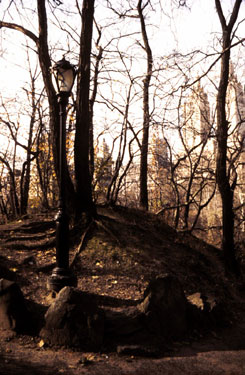|
 |
|
 |
University of Vermont - Graduate Program in Historic Preservation
HP 302 Seminar in Historic Preservation Advocacy
Robert McCullough and Thomas Visser
SPONSOR GUIDELINES AND COURSE GOALS
Course Goals. This third-semester course is intended to introduce students to historic preservation advocacy for non-profit organizations or public agencies. Students are asked to develop projects with four goals in mind. Each project should: (1) advance the cause of historic preservation in some identifiable way; (2) be conducted on behalf of a non-profit or public-sector organization or agency; (3) incorporate a public presentation or event that is attended by at least 20 people; (4) result in a tangible product, written or visual, that is distributed to at least 20 people and that offers a valuable learning experience for the student; and (5) provide work that is meaningful to the sponsor.
A broad goal for the course is to offer students an opportunity
to explore very specific fields of interest and to produce a tangible
example of work that will serve as an introduction to that field.
At the same time, the course fulfills an equally important goal
of providing service and outreach to communities as part of the
educational process.
Sponsor Guidelines. Organizations or agencies interested in becoming sponsors for this course will be asked to identify projects that meet these five goals and address the following guidelines.
1. The final product expected must be capable of clear description.
2. The size of the project should be manageable by a single student or by teams of no more than two students.
3. Sponsors must be willing to provide instruction regarding project objectives. The course instructors will also be available, but ultimately project sponsors must be satisfied with the final product. Communication and instruction are essential part of this guideline.
4. Sponsors will be asked to prepare an evaluation of the student performance, using the attached form. Although final grades will be issued by the course instructors, the sponsor evaluations will represent a substantial part of the final grade.
5. Sponsors will be asked to make a short, thirty to forty
minute presentation to the entire class, discussing the mission
and preservation advocacy activities of their organization.
Project Selection. Students will be given the freedom
to select from a number of proposed projects. Consequently, the
course instructors cannot guarantee that a specific sponsor's
project will be chosen. Nevertheless, instructors will work with
sponsors to develop projects that will appeal to students.
Project Expenses. Student projects are offered to non-profit
organizations and public agencies as part of the university's
commitment to community service and public education. However,
sponsors will be asked to reimburse students for expenses, including
travel, photocopying, film, or other related costs.
Course Schedule and Administration. Project sponsors will be asked to assume responsibility for the following tasks.
1. Submit a short written description of the proposed project to the course instructors by August 15, 2000, and include the name, address, e-mail address, and phone number of the project contact.
2. Work with the student (or students) who select a specific project to prepare a written project statement, which should be signed by the student(s) and sponsor by Friday, September 8, 2000. The project statement should identify potential expenses and explain the method of reimbursement.
3. Review draft submissions, due November 3, 2000, and provide written comments as to content and form by November 13th, 2000. Students are responsible for editing draft submissions for content, grammar, and syntax. Sponsors are not required to review poorly edited materials and will be asked to return them to students without comment.
4. If projects involve documents that include visual materials
and will be published or circulated publicly, sponsors may wish
to make separate arrangements for page layout and design. Responsibilities
for these tasks should be addressed in the project statement.
University of Vermont - Graduate Program in Historic Preservation
HP 302 Seminar in Historic Preservation Advocacy
Robert McCullough and Thomas Visser
PROJECT EVALUATION FORMS FOR SPONSORS
Students will be expected to complete projects that meet all of the sponsor's requirements, and thus sponsors are asked to complete this evaluation form. Although course instructors are responsible for final grading, the sponsor's evaluation will represent approximately three-quarters of the course grade.
In addition to answering the following questions, sponsors will be asked to rank students and their projects on a scale of one to five (1-5). A ranking of one (1) should represent work that meets and exceeds all professional and academic standards of quality. A ranking of five (5) represents work that has not achieved either academic or professional standards for the field.
Name of Sponsor: _____________________
Project Description: _____________________
Name of Student _____________________
Overall rank: _____________________
1. Does the student's work satisfy all the requirements specified in the project statement? If not, what are the shortcomings?
2. Did the project produce meaningful work for the sponsoring organization? If not, in what ways could the project be improved?
3. In what ways did the project advance the cause of historic preservation?
4. Please rate the following on a scale of one (1) strong to five (5) weak:
Accuracy of content: 1 2 3 4 5
Quality of writing: 1 2 3 4 5
Organization or format: 1 2 3 4 5
Quality of visual materials: 1 2 3 4 5
Public presentation: 1 2 3 4 5